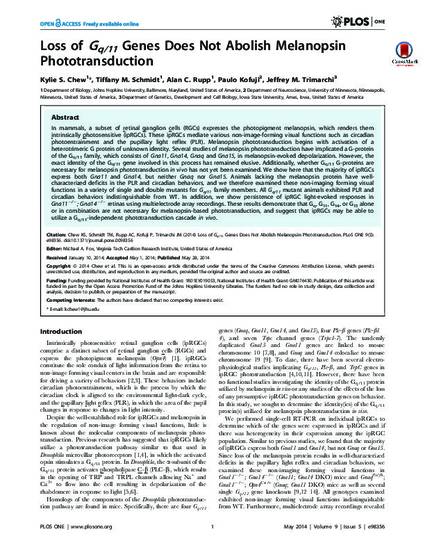
Article
Loss of Gq/11 Genes Does Not Abolish Melanopsin Phototransduction
PloS ONE
Document Type
Article
Disciplines
Publication Version
Published Version
Publication Date
1-1-2014
DOI
10.1371/journal.pone.0098356
Abstract
In mammals, a subset of retinal ganglion cells (RGCs) expresses the photopigment melanopsin, which renders them intrinsically photosensitive (ipRGCs). These ipRGCs mediate various non-image-forming visual functions such as circadian photoentrainment and the pupillary light reflex (PLR). Melanopsin phototransduction begins with activation of a heterotrimeric G protein of unknown identity. Several studies of melanopsin phototransduction have implicated a G-protein of the Gq/11 family, which consists of Gna11, Gna14, Gnaq and Gna15, in melanopsin-evoked depolarization. However, the exact identity of the Gq/11 gene involved in this process has remained elusive. Additionally, whether Gq/11 G-proteins are necessary for melanopsin phototransduction in vivo has not yet been examined. We show here that the majority of ipRGCs express both Gna11 and Gna14, but neither Gnaq nor Gna15. Animals lacking the melanopsin protein have well-characterized deficits in the PLR and circadian behaviors, and we therefore examined these non-imaging forming visual functions in a variety of single and double mutants for Gq/11 family members. All Gq/11 mutant animals exhibited PLR and circadian behaviors indistinguishable from WT. In addition, we show persistence of ipRGC light-evoked responses in Gna11−/−; Gna14−/− retinas using multielectrode array recordings. These results demonstrate that Gq, G11, G14, or G15 alone or in combination are not necessary for melanopsin-based phototransduction, and suggest that ipRGCs may be able to utilize a Gq/11-independent phototransduction cascade in vivo.
Rights
This is an open-access article distributed under the terms of the Creative Commons Attribution License, which permits
unrestricted use, distribution, and reproduction in any medium, provided the original author and source are credited.
Copyright Owner
Chew et al.
Copyright Date
2014
Language
en
File Format
application/pdf
Citation Information
Kylie S. Chew, Tiffany M. Schmidt, Alan C. Rupp, Paulo Kofuji, et al.. "Loss of Gq/11 Genes Does Not Abolish Melanopsin Phototransduction" PloS ONE Vol. 9 Iss. 5 (2014) p. e98356 Available at: http://works.bepress.com/jeffrey-trimarchi/6/

This article is from PloS ONE 9 (2014): e98356, doi: 10.1371/journal.pone.0098356. Posted with permission.